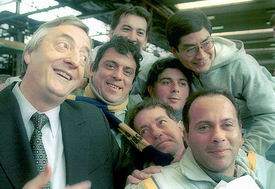Argentina: One year of Kirchner not enough to end reign of inequality
 After 365 days in power, Argentine president Nestor Kirchner enjoys 75% of popularity but still has to face serious challenges ahead: South America's second economy owes 100% of its annual GDP to foreign creditors, 50% of its population lives in poverty and 20% in indigence, as cultural and social debacle is far from improving.
After 365 days in power, Argentine president Nestor Kirchner enjoys 75% of popularity but still has to face serious challenges ahead: South America's second economy owes 100% of its annual GDP to foreign creditors, 50% of its population lives in poverty and 20% in indigence, as cultural and social debacle is far from improving.

On Tuesday, Argentine President Nestor Kirchner will reach one year in power since country's former conservative leader, Carlos Menem –now exiled in Chile- quitted the race for presidency in the second round. Kirchner jumped into the “Pink House” –Argentine Palace of Government- with little more than 22% of the votes, but that's history now: in 365 days, Kirchner's popularity rose to 75%, all a success for this almost unknown Patagonic leader, according to the poor records of his predecessors in office.
Kirchner took office in crucial moment of Argentina's history. South America’s second economy was trying to come out from its worst-ever crisis, as by the beginning of 2003 the most optimistic forecasts said the country would grow up to 2 or three per cent. Thanks to a rational and from time to time non orthodox economic policy, Argentina's GDP jumped 9% last year and its industry recovered its pre-crisis levels in the first trimester of 2004.
When Kirchner became president of Argentina, its Brazilian counterpart, Luiz Inacio Lula Da Silva –the first South American leader in reaching presidency from a working background- was at his highest. However, as Lula continued with orthodox pro-market policies begun losing support from lower classes. Kirchner, in turn, adopted a hard line against IMF bureaucrats and made wonder some ironic Brazilian intellectuals “why Lula had won in Brazil and taken office in Argentina”.
Internally, Kirchner headed a depuration campaign to clean security forces from their genocide background. The president personally fired over 60 Armed Forces’ officers and hundreds of police staff, most of them linked to corruption scandals and open supporters of the military juntas that ruled Argentina from 1976 to 1983. Also, Kirchner ordered parliamentary process to oust some members of the inherited Supreme Court of Justice, liable of the most aberrant rulings during the corrupted administration of Carlos Menem.
While many quickly and enthusiastically supported Kirchner's initiatives, others, like the opposition leader Elisa Carrio, warned on hegemonic tendencies of his government. Carrio says Kirchner spends his time in loud announcements but lacks of a strategic view on current affairs. “There is not an adequate policy to protect key natural resources as drinkable water, oil and gas, and it could lead to the plundering by foreign companies”, told Carrio to PRAVDA.Ru last month.
Kirchner has been welcomed by the “old Europe” from the beginning. His government adopted an independent foreign line from the beginning and did not support US invasion of Iraq. During the campaign, Kirchner had said Bush’s hands were “dirty with blood from innocent people”. However, Kirchner shook the twice as he met US president in Washington first and in Mexico early this year.
Kirchner does not like to be spotted as a “leftist”, “progressive” or “centrist” leader, he likes to call himself as “Peronist”, trying to remark his background as member of Argentine largest “catch all” –and almost indefinable- political party.
However, even when Kirchner enjoys an enormous popularity according to standards among his Latin American colleagues, his challenges are huge. It is easy to find them in Buenos Aires streets, where night after night no less than 25.000 of indigents still dig in the rubbish trying to find something to eat. Or in the faces of almost 2 million of unemployed, hungry as lack of any social care. Or in the faces of the starved children of the poorest regions that have to live with less than a dollar a day in a country that produces food to feed 300 million a year.
Picture: Argentine president Nestor Kirchner with workers in a Buenos Aires' factory
Subscribe to Pravda.Ru Telegram channel, Facebook, RSS!


